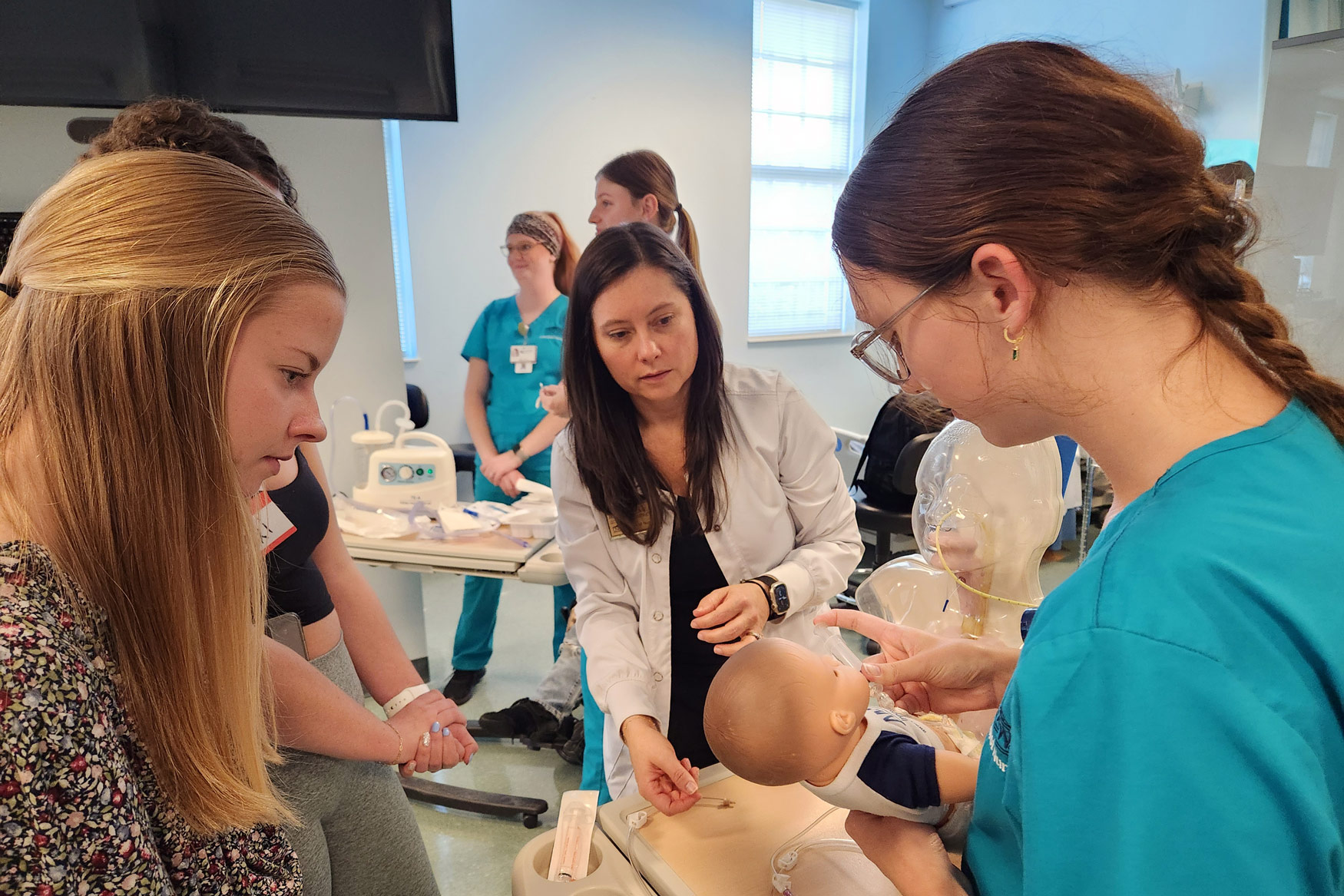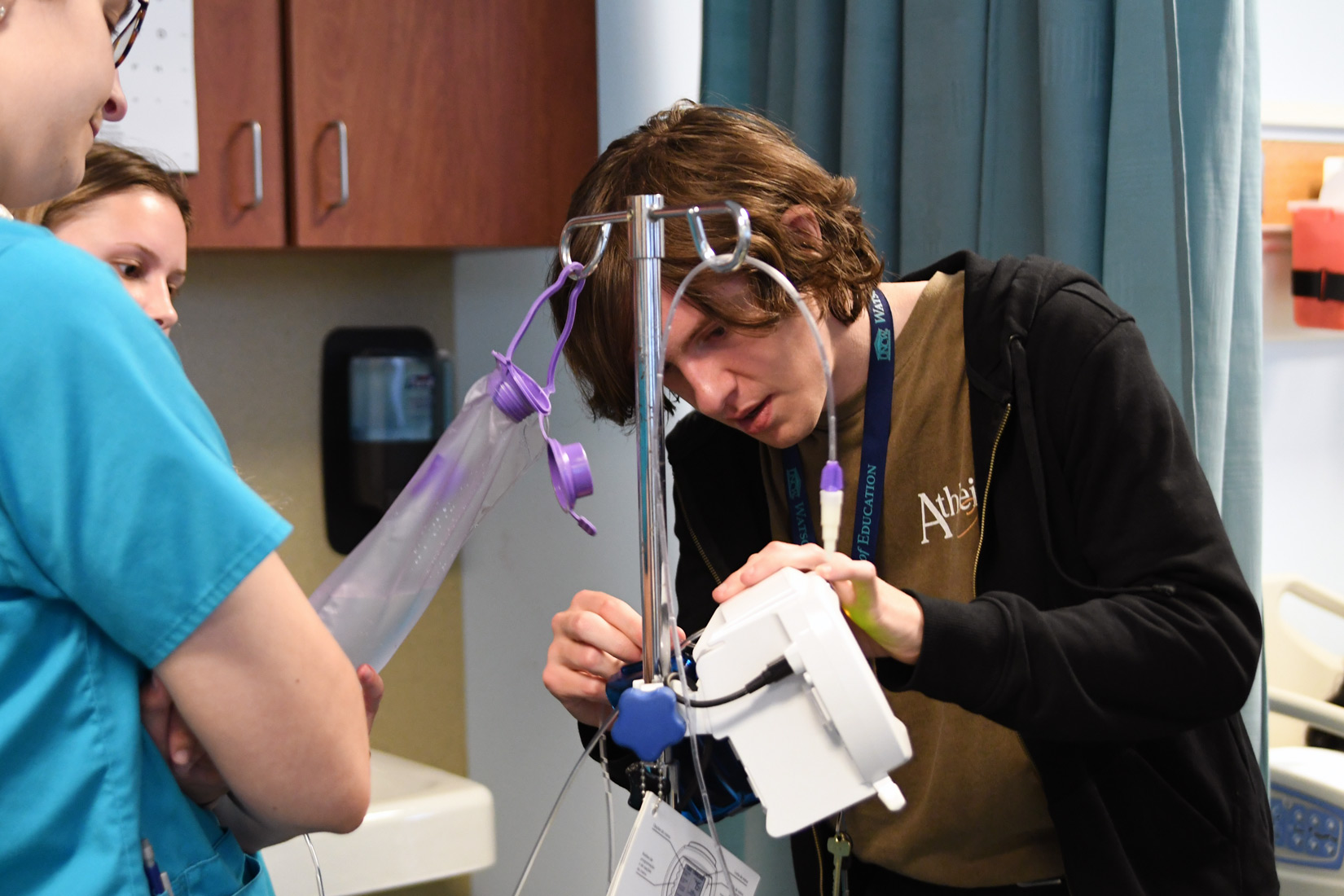
Sharon Richter, Hayley Estrem and Andrea Smith are partnering on a project designed to prepare UNCW special education and nursing students to better meet the needs of children with disabilities. A specific goal of the “Specialized Medical Interventions for Learners with Exceptionalities” (SMILE) Collab is to is to prepare special educators and nurses to collaboratively serve children with disabilities who have complex medical needs.
This fall, participating students learned about the federal law that mandates serving learners with disabilities who have complex medical needs in school settings, and the types of medical interventions that can be performed in schools. On November 10, special education and nursing students met together in UNCW’s Nursing Simulation Lab to practice special medical interventions they are likely to encounter.
“When I started my career, I was nervous about medical interventions because I wasn’t familiar with the procedures,” said Dr. Richter, associate professor of special education at the Watson College. “As special education teachers, your responsibility is to educate, but many times there will be a medical provider in the classroom, and more and more there is a need for the teacher and the medical provider to collaborate. Our goal with this project is to provide you with the knowledge and applied learning experiences that make it easier to do that.”
UNCW’s Nursing Simulation Lab is set up to resemble a hospital room, complete with medical equipment and high-fidelity, life-like mannequins of varying ages, genders and ethnicities. At the start of the session, Smith and 12 nursing students explained and demonstrated common medical support procedures, including procedures needed for students with a tracheotomy tube, an NG or Mickey button feeding tube, or those who experience a seizure. Then, the nursing students conducted small-group demonstrations and provided “dos and don’ts” to ensure first, and foremost, each child’s safety.
During the demos, students explained the A,B, C’s of nursing (open the Airway, assess the patient’s Breathing and assess their Circulation), and discussed what to do in the event of a seizure (if the child falls down, turn them on their side, hold their head to prevent injury, and time it because if it goes on too long it becomes a medical emergency.) Their overall advice: “Remain calm because when you’re working with kids your reaction influences how they will react.”
On November 13, students attended a panel discussion with three parents of children with disabilities who have complex medical needs. During the discussion, moderated by Dr. Richter, the parents shared their perspectives about navigating the systems of special education and medical care in the schools to support their children.
“We are very excited about the SMILE Collab project,” Richter said. “We hope this ongoing collaboration and applied learning will give both special education and nursing students an enhanced understanding of the ‘whole’ learner with disability who has complex medical needs, which will be meaningful in participants' future career and community-based experiences.”
Dr. Richter is the coordinator of Watson’s Special Education – Adapted Curriculum program. Dr. Estrem is an associate professor of nursing and Ms. Smith is a faculty member in UNCW’s School of Nursing, currently pursuing a doctorate in Educational Leadership with Specialization in Curriculum and Instruction in the Watson College of Education. A UNCW Pedagogy Initiatives Award funded the SMILE Collab project.

About Watson’s Special Education Programs
UNCW’s Watson College of Education offers two bachelor’s degree programs for students interested in pursuing a career as a special education teacher:
Special Education General Curriculum - This program prepares special educators to teach individuals with mild to moderate disabilities from Kindergarten through 12th grade.
Special Education Adapted Curriculum - This program prepares special educators to teach learners with significant intellectual and multiple disabilities from Kindergarten through 12th grade.
The programs are offered in a cohort model, designed to provide a strong community of support for undergraduate students majoring in special education. For more information, visit the Special Education website.
This article has the following tags: Engagement Academics Watson College of Education Research & Innovation


